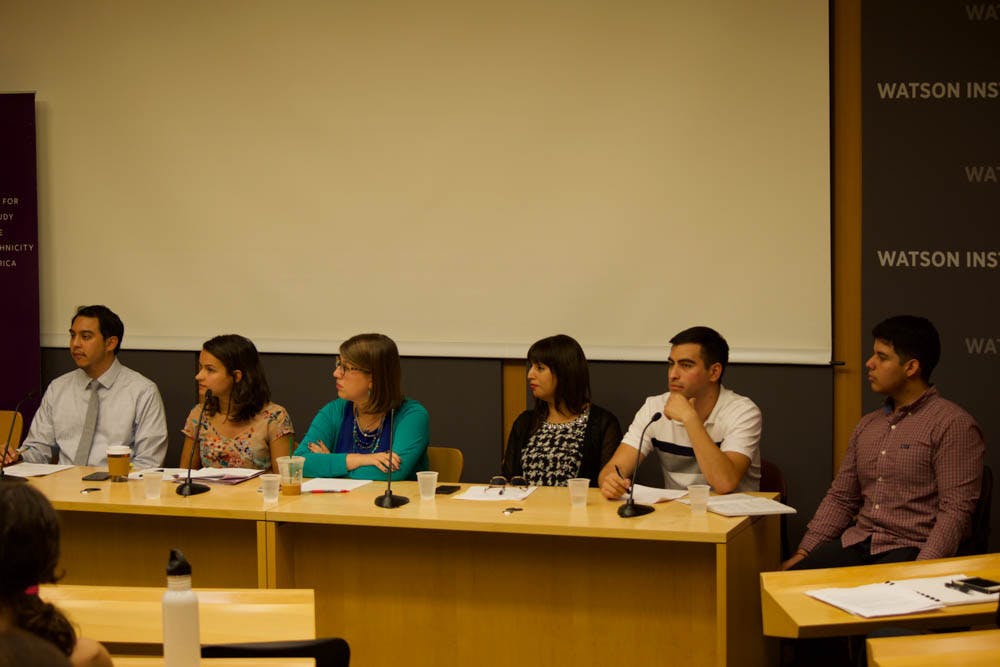In a discussion titled “UndocuKnowledge: A DACA Teach In and Community Conversation,” a panel of students, faculty and staff highlighted the importance of leaving the “good immigrant bad, immigrant” mentality behind in exchange for a movement that uplifts all 11 million undocumented immigrants currently living in the United States. Moderated by Tricia Rose, associate dean of the faculty for special initiatives, director of the Center for the Study of Race and Ethnicity in America and professor of Africana studies in the Watson Institute for International and Public Affairs, the panelists touched on the Deferred Action for Childhood Arrival program’s impact on undocumented immigrant communities, the uncertainty emerging from its revocation and the activism that influences laws and public opinion.
“I remember very clearly being a freshman in high school and not thinking that I was going to go to college — not thinking that was ever a possibility for me, so why try?” said John Lopez-Aldas ’18.5, an undocumented student.
Lopez-Aldas was 16 years old when DACA came out, and its existence gave him the confidence to excel in community college and transfer to Brown, he said. But Lopez-Aldas emphasized that DACA also has adversely affected perception of immigrants.
“While DACA allowed for positive change in the lives of many people such as myself, it also further ostracized people who did not qualify for it or were not otherwise able to access it,” he said.
Renata Mauriz ’17.5 expanded on Lopez-Aldas’s assertion, explaining that many public policy advocates rely on categorizing immigrants into positive and negative groups in order to push forward legislation such as the DREAM Act and DACA.
“We see mostly advocates in D.C. pushing for the same binary by putting (a Dreamer) as this exceptionally good immigrant who is very ingrained in a national American identity, who has assimilated to the United States, who has no criminal record, who (is American) except for the papers,” she said.
Mauriz said she understands this classification may at times be politically necessary, but that the time has come to harness the positive association with Dreamers to fight on behalf of all immigrants.
“It is not possible under Trump to pass legislation for the 11 million — I’m just being real,” she said. But she added that Dreamers could use their platform to advocate for other immigrants, too.
Assistant Professor of American Studies Monica Martinez provided context for Lopez and Mauriz’s discussion of immigrant mobilization and perception. She told the history of push-and-pull migration that created today’s undocumented immigration from Mexico. The historical progression she highlighted included the transition from the United States’ active recruitment of Mexican workers to mass deportation to collaboration between the two countries to the era of undocumented immigration, which culminated with our present state.
Assistant Professor of American Studies Kevin Escudero complemented Martinez’s presentation with an overview of the policy activity that led to the DREAM Act, DACA and DACA’s recent rollback. In his oration of this history, Escudero pointed to the importance of inclusivity in advocacy.
“The framing of this movement as something that is not for a select few but is for a larger community is really important,” he said.
Assistant Professor of Education Andrea Flores supported the call for a comprehensive movement with a narrative about a protest she attended with Latinx youth in Nashville, Tenn. She ended her remarks with an iteration of a speech from the protest.
“I am somebody, and I deserve full equality. Right here, right now. My mother is somebody, she deserves full equality. Right here, right now. My father is somebody, he deserves full equality. Right here, right now,” she said.
Panelists also addressed the University’s role in supporting undocumented and DACA students. First-Generation and Low Income Student Center Program Director Julio Reyes ’12 emphasized the mental health challenges that come from the uncertainty of one’s legal status. He expressed the importance of increased financial aid, funding for DACA renewals and a shift in admissions policy, among others.
Provost Richard Locke P’18, who opened the discussion, affirmed the University’s commitment to all of its students, regardless of documentation status.
“This is a moment where we have to walk the talk and based on our values, make sure we do everything we can to protect our students,” he said.
Alexis Roman ’21 told The Herald he was glad he spent his Tuesday evening at Watson.
“I’m glad that I’m now equipped with more language to talk about DACA,” he said. “That’s exactly what I wanted.”





